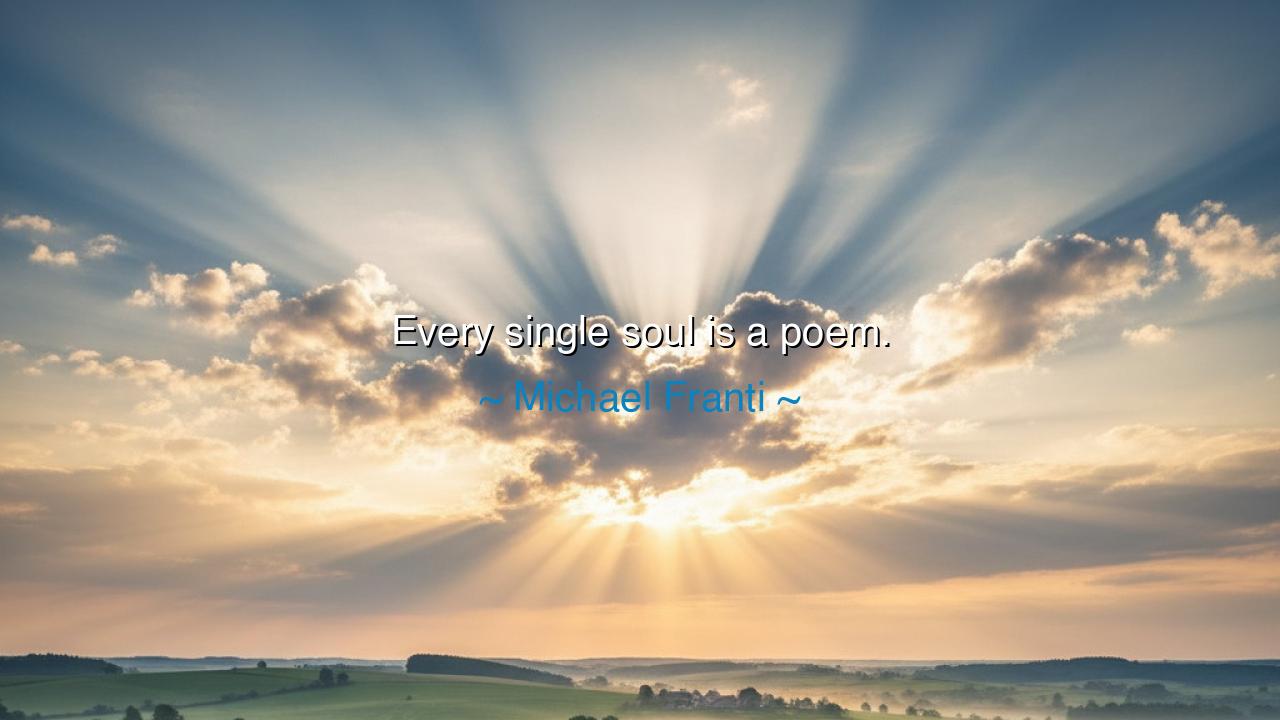
Every single soul is a poem.






Michael Franti, musician, poet, and seeker of light, once proclaimed: “Every single soul is a poem.” In these words, he reveals a vision as old as humanity yet forever new—that each human life, no matter how humble or forgotten, is a living work of art. A poem is not only words on a page but rhythm, struggle, beauty, and mystery woven together. So too is the soul. Each heartbeat, each act of kindness, each trial endured becomes a verse. And when strung together, a lifetime reveals itself as a poem written by existence itself.
The origin of this thought lies in Franti’s lifelong journey as an artist who blends music, activism, and spirituality. He has walked among the marginalized, sung with the broken-hearted, and lifted up the voices of those silenced by hardship. To him, people are not statistics or nameless faces—they are songs waiting to be heard. Thus he declares that every single soul, not just the famous or the eloquent, is a poem: unique, resonant, and carrying its own unrepeatable beauty.
The ancients would have nodded in agreement. Did not Homer, in the Iliad, describe even the humblest soldier by name before he fell, as if to grant him poetic immortality? Did not the psalmists sing that man is “fearfully and wonderfully made”? They too believed that life itself is art, that the soul is a vessel of divine poetry. In saying each soul is a poem, Franti revives this sacred vision: that every person carries within them a rhythm, a song, a truth that cannot be replaced.
Consider the life of Anne Frank. A young girl, hidden away in an attic during the terror of war, she wrote her thoughts not for fame, but for herself. Yet her diary, simple and sincere, revealed the poetry of her soul to the world. She did not intend to become a writer remembered by generations, but her life, fragile and cut short, became a living poem. Her example proves Franti’s words: even in suffering, even in obscurity, the soul’s voice carries a poetry that speaks across time.
Franti’s saying also carries a challenge. If every soul is a poem, then we must learn to read one another with reverence. Too often we dismiss, judge, or ignore those around us. Yet the poet sees the beauty in the overlooked, the music in the mundane. To honor another’s soul is to pause, to listen, and to recognize that within their struggles and joys is a verse written by the universe itself. Every person we meet is a stanza in the great song of humanity.
The lesson for us is clear: live as though your soul were a poem, and treat others as though theirs were too. Ask yourself: what story am I writing with my days? What rhythm do my choices create? What beauty can I leave behind in the verses of my life? And when you meet others, look upon them with wonder, knowing that they too carry a poem shaped by trials, loves, and dreams.
Practical action follows. Listen deeply when others speak, as though catching lines of their living poem. Journal your own experiences, not to polish them into perfection, but to honor the rhythm of your life. Celebrate differences, for each soul writes in its own meter. And above all, be kind, for harshness stains the page of another’s verse, but kindness strengthens it.
So let us remember Franti’s words: “Every single soul is a poem.” Walk through the world with reverence, reading the poetry around you, and writing your own with courage and love. In this way, life itself becomes a great anthology, and the song of humanity—woven from countless souls—rises like a hymn to eternity.






LTDung Le Trong
This quote by Michael Franti really makes me reflect on the deeper meaning of life. If every soul is a poem, does that mean we are all artists of our own existence? I wonder, is it the experiences we go through that shape us into poems, or is it the way we choose to process and express those experiences? What makes a soul’s poem worth reading, and how do we recognize its beauty?
HPtran huy phuong
The idea that ‘every single soul is a poem’ feels empowering, as if we all have the potential to live meaningful, expressive lives. But it also raises the question: Are some people’s souls more ‘poetic’ than others? Is it about the actions we take, the words we say, or the way we choose to live? How can we make our own souls more aligned with that poetic ideal, and how do we recognize it in others?
NPHuynh Nam Phuong
I really love this quote, but I’m curious—what does it mean for a soul to be a poem? Is it about the way we live our lives, or is it more about the depth of our inner thoughts and emotions? Can every soul be a poem, or are some people better at expressing their ‘poetry’ than others? How do we see the ‘poetry’ in others, and how do they see it in us?
NTNgoc Truc
Michael Franti’s quote is a beautiful reminder of the uniqueness and depth of every individual. It makes me think about how we all have our own stories, emotions, and experiences that shape who we are, much like a poem. But does this mean that every person’s life is inherently poetic, or is there a choice in how we live that allows us to reflect that beauty? How do we express the poetry within us?